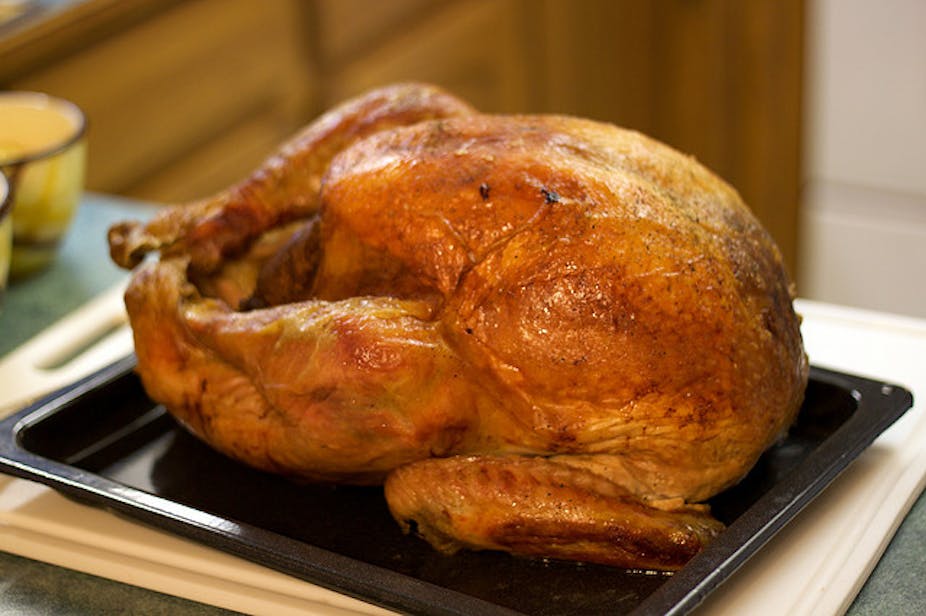It has been long-rumoured that gobbling up turkey meat has a mysterious soporific effect, rendering its consumers progressively drowsier. Sounds like a good story, and certainly one that’s worth checking out.
There are many things that determine when we feel tired and desirous of sleep. Obviously, the longer we are awake, the sleepier we become (this is called homeostatic regulation). We are usually awake for 16 hours before we get sleepy.
This is balanced against the needs of our body clock (circadian rhythm) that links sleep with the other cycles in the body, such as temperature, growth and levels of brain chemicals, like serotonin and melatonin
Our circadian rhythm is entrained by external cues such as light, temperature, activity, eating and social routines (known as zeitgebers), by altering levels of these sleep regulators to set the time on the clock.
So how could my turkey extravaganza stuff up this well-oiled apparatus?
Turkey meat is predominantly protein, like potatoes are predominantly carbohydrate. During digestion, protein is rapidly broken down into its constituent parts, which are amino acids.
Some of these amino acids have direct action on brain chemistry.
In particular, tryptophan is an essential amino acid used by the brain for the synthesis of serotonin and melatonin. Rising levels of serotonin and melatonin in the brain signal the end of the day.
Turkey is rumoured to make you sleepy because it contains tryptophan (about 200mg/100g). Some tryptophan is also present in that glass of milk that is said to help you get to sleep at night.
But there’s nothing special about turkey. Most protein rich foods have tryptophan, from meat and eggs, to soy and spirulina.
Some people do take large amounts of tryptophan to “naturally” increase their serotonin levels and help them fall asleep. However, its sedating effect is variable and weak in most people, even in the doses used to treat insomnia (2 grams to 5 grams).
Of course, much of the evidence linking turkey to sedation is circumstantial.
Even if you are getting enough sleep, it is common to feel a temporary drop in alertness in early afternoon, especially of you are a morning person.
This “post-lunch dip” is often attributed to overindulgence at lunchtime. However, it is not necessarily a consequence of meal ingestion.
It is quite normal to have a dip in alertness half way between waking up in the morning and going to sleep at night, as a consequence of our circadian rhythms
So if it’s not the turkey, maybe it’s something’s that goes with it?
Some studies show that a high-carbohydrate lunch might exacerbate the post-lunch dip. So maybe it was the dessert and not the dinner.
If we eat the turkey meat on its own, all the other amino acids released following its digestion compete for transport into the brain. This makes it hard for tryptophan to get in to slow things down.
But a meal that is also rich in carbohydrates (whether dessert, rice or potatoes) also stimulates the release of insulin, which increases the uptake of most amino acids into our muscles, but not tryptophan.
This leaves tryptophan with fewer competitors to access the brain, raises up serotonin/melatonin and leads to bringing down the shades.
Meals rich in fat also have an effect on sleepiness, perhaps even greater than that of carbohydrates. This is possibly due to release of peptide hormones, like cholecystokinin (CCK). So don’t eat the skin!
Finally, there is satisfaction. Cooking ingredients cannot explain the relaxing effects of good old-fashioned contentment that comes after a perfect roast.
Some of this is satiety. Some of this is psychological, much like sex. In fact, many of the same brain signals are involved.
The likely truth of the turkey myth is in the totality of the experience. Turkey meat is not a sleeping pill. But you can’t replicate its actions by just listing its ingredients.
Contentment is real, and although not unique to turkey, it is seasonally reproducible.
In the same way, an apple cannot be put in a tablet. It is the crunch, the aroma, the texture, and the feel.
A turkey sandwich simply doesn’t cut the mustard.
Do you have a medical question or myth you would like to see explored? Post it in the comments field below or email

